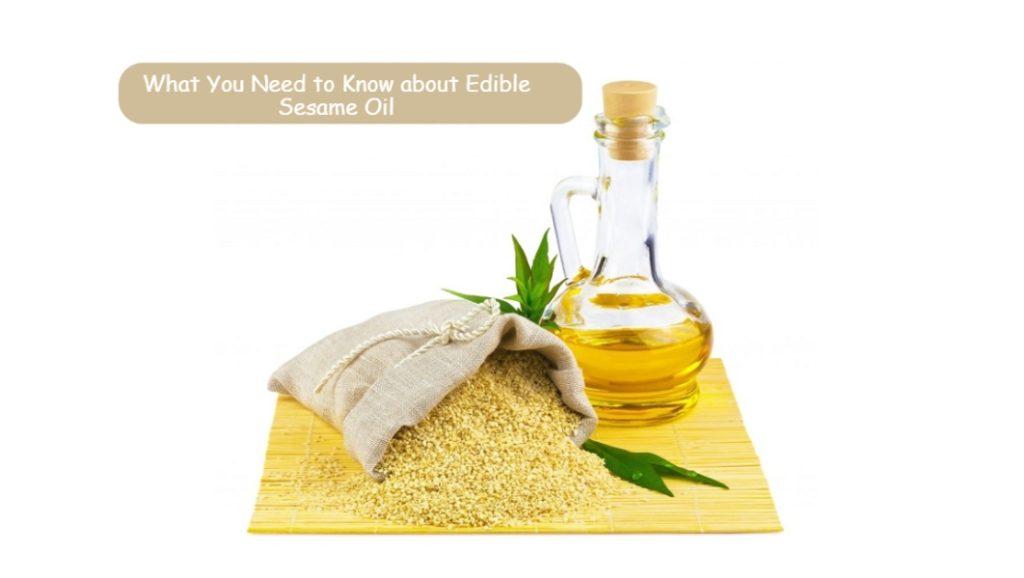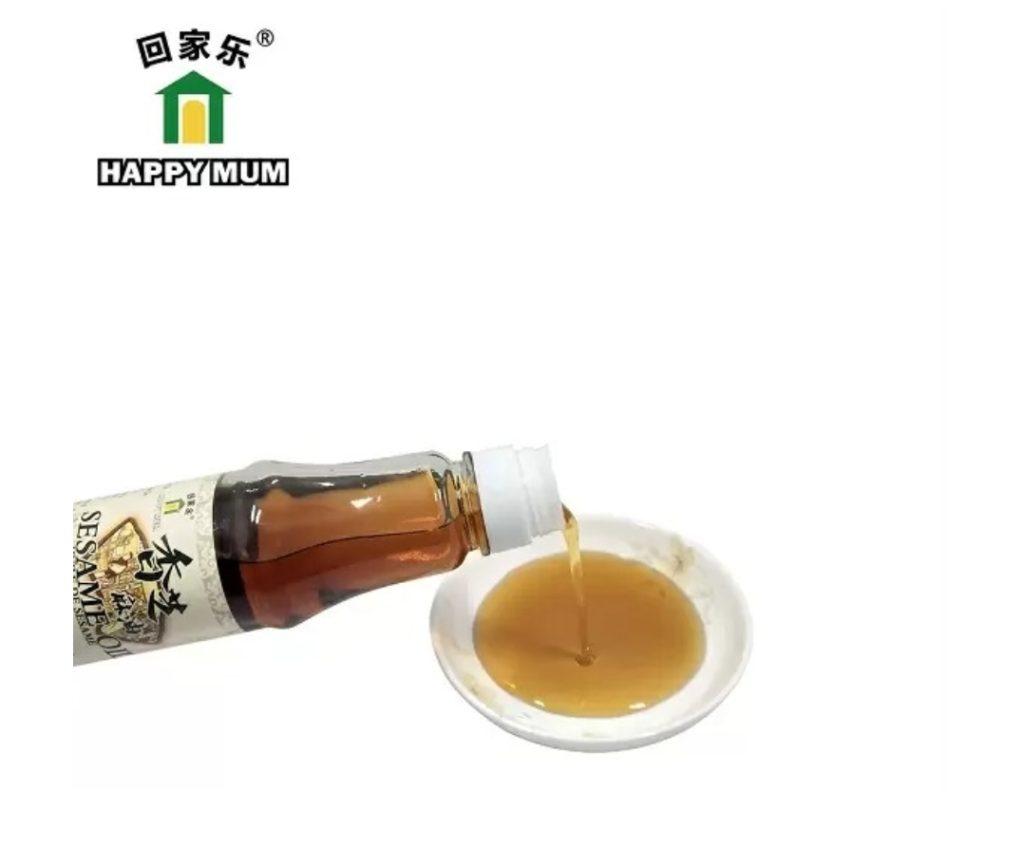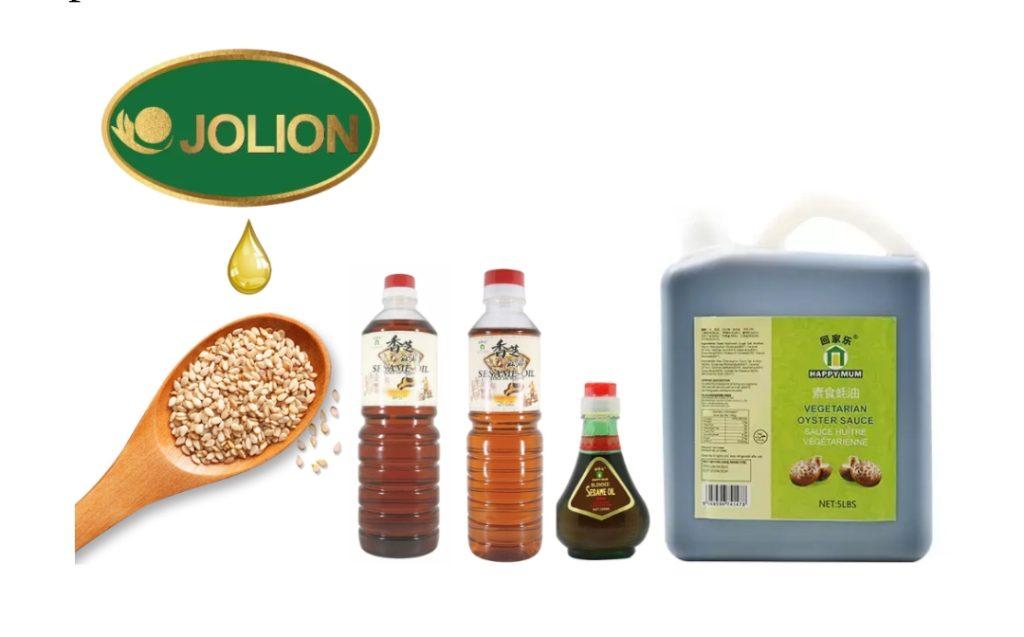Edible sesame oil is popular in cooking for several reasons. It is a vegetable oil made from sesame seeds. The oil is one of the first crop-based oils to be discovered. Its distinct nutty flavor and aroma enhance the taste of various dishes, particularly in South Indian, Middle Eastern, African, and Southeast Asian cuisines. The unique taste of sesame oil adds depth and richness to stir-fries, marinades, dressings, and sauces.
Secondly, sesame oil has a high smoke point, which means it can be heated to relatively high temperatures without breaking down or producing harmful compounds. This makes it suitable for cooking methods such as sautéing, frying, and deep-frying.

What Is Sesame Oil?
Edible sesame oil is a vegetable derived from sesame seeds, which are the seeds of the sesame plant (Sesamum indicum). It is one of the oldest known edible oils and has been used for thousands of years in various cuisines and traditional medicines

Sesame Oil Production Process
Edible sesame oil typically involves the following steps:
- Harvesting: Sesame seeds are harvested from the sesame plant, primarily in tropical and subtropical regions.
- Cleaning: The harvested seeds are thoroughly cleaned to remove impurities such as dirt, stones, or debris.
- Roasting (optional): In the case of toasted sesame oil, the seeds may be lightly roasted to enhance the flavor and aroma.
- Pressing: The cleaned seeds are then pressed to extract the oil. This can be done through various methods, including traditional mechanical pressing or modern expeller pressing.
- Filtering: The extracted oil is often filtered to remove any remaining particles or sediments.
- Refining (optional): Some sesame oils undergo a refining process to remove impurities, neutralize odors, and increase shelf life. This process typically involves heat and chemical treatments.
- Packaging: The final sesame oil is packaged and ready for distribution.
Sesame Oil Uses in Cooking
Here are some typical applications of sesame oil used for cooking:
- Flavoring: Sesame oil is often used as a flavoring agent to add a nutty taste and aroma to various dishes. It is commonly used in stir-fries, marinades, dressings, and sauces.
- Cooking: Because sesame oil has a high smoke point, it can be used in high-temperature cooking methods such as sautéing, frying, and deep-frying.
- Seasoning: Sesame oil is used as a finishing touch or drizzled over cooked dishes to enhance their flavors in some cuisines.
- Dipping sauce: Sesame oil is sometimes mixed with other ingredients like soy sauce, vinegar, or spices to create flavorful dipping sauces for dumplings or other appetizers.
- Traditional medicine: Sesame oil is often employed because of its possible health benefits. It has anti-inflammatory, antioxidant, and nourishing effects.
It’s important to note that sesame oil, like any other oil, should be used in moderation as part of a balanced diet, considering its caloric content.
FAQs About Edible Sesame Oil
Q1: Is Edible Sesame Oil Good For Health?
When used in moderation, edible sesame oil can be a useful complement to a healthy diet. It contains many monounsaturated and polyunsaturated fats. These fats are considered healthier alternatives to saturated fats. Sesame oil also includes vitamin E, an antioxidant that aids in the protection of the body’s cells. Additionally, it may have anti-inflammatory properties and can contribute to overall heart health. However, because sesame oil is high in calories, it should be used in moderation as part of a balanced diet.

Q2: How Long Does Sesame Oil Last?
The shelf life of sesame oil can vary depending on factors such as the processing method and storage conditions. Generally, unrefined or cold-pressed sesame oil has a shorter shelf life than refined sesame oil. Unopened sesame oil stored in a cool, dark place lasts about 6 to 12 months. Once opened, it is recommended to use it within a few months for optimal freshness and flavor. Refined sesame oil may have a longer shelf life due to the refining process, but it’s still essential to check the product label for specific storage and expiration date information.
Q3: Does Sesame Oil Have Any Allergenic Properties?
Individuals allergic to sesame seeds may experience adverse reactions to sesame oil. Sesame seed allergy is becoming more common, and even a tiny amount of sesame oil can trigger an allergic reaction in sensitive individuals. Individuals with known sesame seed allergies must avoid sesame oil and carefully read product labels to identify potential sesame oil content. If you suspect an allergy or have concerns, it’s best to consult with a healthcare professional for proper diagnosis and guidance.
Q4: How Does Edible Sesame Oil Differ From Other Cooking Oils?
Edible sesame oil differs from other cooking oils in flavor, aroma, and nutritional composition. It has a distinct nutty flavor and aroma, which adds a unique taste to dishes. Sesame oil has a relatively high smoke point compared to other oils, making it suitable for high-heat cooking methods.
Q5: How to Store Sesame Oil?
To ensure the freshness and quality of sesame oil, it’s essential to store it properly. Here are some guidelines for storing sesame oil:
- Keep it in a cool, dark place: Exposure to light, heat, and air can degrade the quality of sesame oil. Store it in a cool pantry or cupboard away from direct sunlight and heat sources.
- Seal the bottle tightly: To prevent air from entering and oxidizing the oil, make sure the cap or lid of the sesame oil bottle is tightly secured.
- Avoid moisture: Moisture can cause the oil to spoil quickly. Keep the bottle away from humid areas such as the kitchen sink or stove.
- Check for rancidity: Over time, sesame oil can become rancid. If the oil develops an off smell, taste, or appearance, it’s best to discard it.
For more details about how to store sauces, please read Keeping Condiments at Their Best: Essential Storage Guidelines.
Where to Get Edible Sesame Oil
When sourcing edible sesame oil, you should look for a reliable supplier. One reputable supplier is Jolion Foods. Jolion As a bulk sauce supplier, Jolion Foods is known for providing high-quality sesame oil and offers options for wholesale purchases and ODM (Original Design Manufacturer) and OEM (Original Equipment Manufacturer) services.
Jolion Foods prides itself on producing premium sauces that meet rigorous quality standards. They carefully select sesame seeds and employ advanced techniques to extract the oil while preserving its natural flavor and nutritional benefits. Choose Jolion Foods today as your qualified supplier, and experience the excellence of Jolion Foods, your trusted and responsible business partner.

